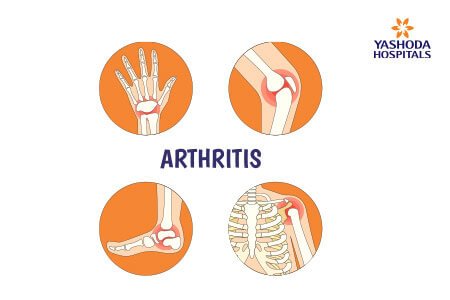Arthritis
Types, Causes, Symptoms, Risk Factors, Complications, Prevention, Diagnosis and Treatment
What would you like to know?
What is Arthritis?
Arthritis is an inflammation of the joints that may affect one or multiple joints. There are over 100 different types of arthritis, each with different causes including wear and tear, infections, and underlying diseases. Arthritis of joints including foot, ankle, hands, knee, shoulder, thumb, and wrist arthritis are quite commonly found in people worldwide. Living with arthritis can be difficult, but medications, physiotherapy, and sometimes surgery help reduce the discomfort, pain and improves the quality of life.

What are the types of Arthritis?
The different types of arthritis are listed below:
- Osteoarthritis: It is one of the two most common types of arthritis. It occurs when the cartilage that acts as a protective cushion at the end of the bones wears down. This happens over time. Although this can damage any joint, it most commonly affects joints in hands, knees, hips and spine.
- Rheumatoid arthritis: A chronic inflammatory disorder that affects more than just joints. Rheumatoid arthritis can damage a variety of body systems including the skin, lungs, eyes, blood vessels and heart.
- Juvenile arthritis: This is an autoimmune disease which is indicated by inflammation or swelling of the synovium (the soft tissue that lines the entire inner surface of the joint) in children that age 16 years or younger.
- Spondyloarthropathies: Also known as spondyloarthritis, refers to a group of inflammatory rheumatic diseases including ankylosing spondylitis and psoriatic arthritis. The onset of this disease is indicated by joint pain and inflammation that may sometimes affect the spine.
- Lupus erythematosus: Known as Systemic Lupus Erythematosus (SEL) in medical terms. It is an autoimmune disease in which the body’s immune system attacks healthy tissues of the body mistakenly. It can affect the joints, skin, kidneys, blood cells, brain, heart’ and lungs.
- Gout: It is caused due to excessive uric acid in the bloodstream. Pain and inflammation occur when an excessive amount of uric acid is deposited in the joints in a crystallized form.
- Infectious and reactive arthritis: It occurs in reaction to an infection by certain bacteria that leads to inflammation and pain in the joints.
- Psoriatic arthritis: It is a type of arthritis that affects people with psoriasis – a condition in which the skin is covered with red patches topped with silvery scales.
What are the causes of Arthritis?
Arthritis causes may vary based on the type. However, the common causes are:
- Injury – Any physical injury to any type of joint may lead to post-traumatic arthritis.
- Abnormal metabolism – Studies show that people with metabolic syndrome are susceptible to osteoarthritis.
- Inheritance – Mutations in genes for collagen can lead to osteoarthritis
- Infections – Infections that cause inflammation in the joints can lead to arthritis.
- Immune system dysfunction – The immune system of a person with a dysfunctioning immune system dysfunction can attack the lining of the joints causing inflammation in the joints that may lead to arthritis
You may also interested in reading
Read More Information
References:
- 5 Common Types of Arthritis. WebMD. Available at: https://www.webmd.com/rheumatoid-arthritis/guide/most-common-arthritis-types. Accessed on June 3, 2020.
- Arthritis Risk Factors. CDC. Available at: https://www.cdc.gov/arthritis/basics/risk-factors.htm Accessed on June 3, 2020.
- Arthritis- Diagnoses and Treatment. Mayo Clinic. Available at: https://www.mayoclinic.org/diseases-conditions/arthritis/diagnosis-treatment/drc-20350777 Accessed on June 3, 2020.
Disclaimer:
“The content of this publication has been developed by a third party content providerwho are clinicians and/or medical writers and/or experts. The information contained herein is for educational purpose only and we request you to please consult a Registered Medical Practitioner or Doctor before deciding the appropriate diagnosis and treatment plan.”



 Appointment
Appointment Second Opinion
Second Opinion WhatsApp
WhatsApp Call
Call More
More





